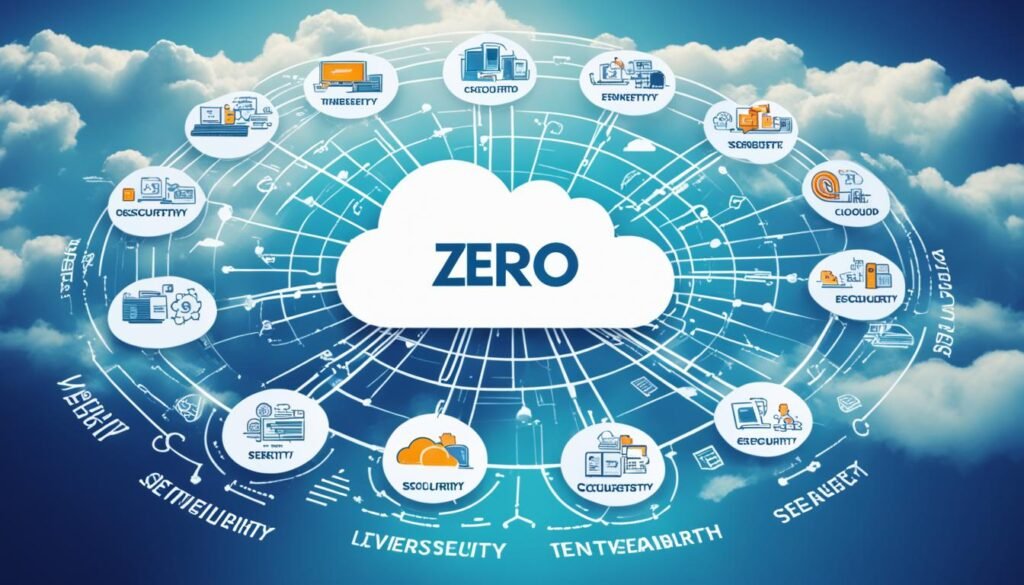Cloud hosting has become an integral part of modern business infrastructure, offering numerous benefits such as scalability, cost-effectiveness, and accessibility. However, with these advantages come concerns about the security of data and assets stored in the cloud environment. In this article, we will delve into the important security features of cloud hosting and their role in providing a secure and reliable cloud service.
Key Takeaways:
- Cloud hosting provides a range of security features to protect data and assets in the cloud environment.
- Understanding the different types of cloud environments is crucial for implementing appropriate security measures.
- Cloud service providers play a vital role in maintaining a secure cloud infrastructure.
- Key security features of cloud hosting include network security controls, data encryption, and secure access management.
- Challenges in cloud security can be mitigated by following best practices and implementing robust security policies.
Understanding Cloud Computing and Security
Cloud computing has revolutionized the way businesses access and utilize resources, software, and databases. Instead of relying on local hardware, cloud computing enables users to access these services over the internet, providing unparalleled flexibility and scalability. However, this newfound convenience also introduces security challenges that organizations need to address to protect their valuable data and assets.
Types of Cloud Environments
There are different types of cloud environments that organizations can leverage based on their specific needs and preferences. Understanding the characteristics of these environments is essential for implementing appropriate security measures. The main types of cloud environments include:
- Public Cloud: This type of cloud environment is provided by third-party cloud service providers and is accessible to the general public. It offers a cost-effective solution for organizations but requires careful consideration of security measures to ensure data protection.
- Private Cloud: A private cloud is dedicated solely to a single organization, providing enhanced control and security. Organizations can customize security measures to meet their specific requirements and comply with industry regulations.
- Hybrid Cloud: A hybrid cloud environment combines the benefits of both public and private clouds. It allows organizations to take advantage of the scalability and cost-efficiency of public clouds while maintaining sensitive data and critical applications in a private cloud, offering a balance between security and flexibility.
Each type of cloud environment has its own security considerations, and organizations should tailor their security strategies accordingly to mitigate risks and protect their data.
Key Security Challenges
Cloud computing presents unique security challenges that organizations must address to ensure data protection and mitigate vulnerabilities. These challenges include:
- Ensuring Confidentiality: As data travels over public networks, maintaining confidentiality becomes paramount. Encryption and robust access controls are essential to prevent unauthorized access to sensitive information.
- Managing Identity and Access: With multiple users accessing cloud resources, managing identity and access control becomes complex. Implementing strong authentication mechanisms, such as multi-factor authentication, can help protect against unauthorized access.
- Protecting Data Integrity: Verifying the integrity of data stored and transmitted in the cloud is crucial to ensure its accuracy and reliability. Implementing data integrity checks, such as hashes and digital signatures, helps detect any unauthorized modifications.
- Securing Shared Resources: In shared cloud environments, ensuring the security of shared resources is vital. Employing virtual firewalls, intrusion detection systems, and micro-segmentation techniques can help isolate resources and prevent unauthorized access.
Implementing Cloud Security Measures
To protect their data and assets in the cloud, organizations should implement appropriate security measures:
- Access Control: Implement strict user access controls and permission levels to ensure that only authorized individuals can access sensitive data and resources.
- Encryption: Apply robust encryption techniques to protect data during transmission and storage, reducing the risk of data breaches.
- Regular Auditing and Monitoring: Conduct regular audits and monitor cloud environments for any unauthorized activities or potential security breaches.
- Security Awareness and Training: Educate employees about cloud security best practices, including the importance of strong passwords, phishing awareness, and data protection.
- Vulnerability Management: Regularly patch and update software and systems to address security vulnerabilities and protect against potential threats.
Implementing these security measures helps organizations establish a robust cloud security posture and safeguard their critical data and assets.
By understanding the intricacies of cloud computing and implementing appropriate security measures, organizations can confidently embrace the benefits of the cloud while safeguarding their data and assets. In the next section, we will explore the essential role that cloud service providers play in ensuring the security of cloud hosting.
The Role of Cloud Service Providers in Security

When it comes to ensuring the security of cloud hosting, cloud service providers play a vital role. These providers understand the importance of safeguarding the cloud infrastructure and implement robust security solutions to protect it. Let’s take a closer look at the key security measures implemented by cloud service providers:
Secure Access Controls
Cloud providers prioritize secure access controls to prevent unauthorized access to data and resources. They employ authentication and authorization mechanisms to ensure that only authorized users can access the cloud. By implementing strong access controls, cloud service providers minimize the risk of data breaches and protect sensitive information.
Identity and Access Management (IAM) Systems
Identity and Access Management (IAM) systems are integral to cloud security. Cloud providers utilize IAM systems to manage user identities, enforce access policies, and monitor user activities within the cloud environment. IAM systems play a crucial role in maintaining the integrity of cloud resources and preventing unauthorized activities.
Encryption Mechanisms
Encryption is a fundamental component of cloud security. Cloud service providers employ robust encryption mechanisms to protect sensitive data during storage and transmission. By encrypting data, they ensure that even if it is intercepted or accessed by unauthorized individuals, it remains unreadable and useless.
With these security measures in place, cloud service providers ensure that the cloud infrastructure remains protected from external threats. They actively monitor and update their security protocols to address emerging vulnerabilities and stay ahead of potential risks.
By partnering with reputable cloud service providers that prioritize security, businesses can leverage their expertise and resources to create a secure cloud environment for their data and applications. These providers offer comprehensive cloud security solutions that enhance the overall security posture of organizations.
Cloud service providers play a critical role in ensuring the security of cloud hosting. Their implementation of robust security solutions, such as secure access controls, IAM systems, and encryption mechanisms, helps protect the cloud infrastructure and prevents unauthorized access to data and resources.
To illustrate the importance of cloud security solutions, consider the following table that highlights the key features and benefits provided by reputable cloud service providers:
| Cloud Provider | Cloud Security Solution | Cloud Infrastructure | Identity and Access Management |
|---|---|---|---|
| Amazon Web Services (AWS) | Amazon GuardDuty – Intelligent threat detection and monitoring | AWS CloudTrail – Tracking API activity and audit logging | AWS Identity and Access Management (IAM) – Centralized user access control |
| Microsoft Azure | Azure Security Center – Threat protection and security management | Azure Virtual Network – Isolation and secure connectivity | Azure Active Directory – Identity and access management |
| Google Cloud Platform (GCP) | Google Cloud Security Command Center – Visibility and monitoring | GCP VPC – Network isolation and traffic control | GCP Identity and Access Management (IAM) – User access management |
Key Security Features of Cloud Hosting

Cloud hosting offers a variety of security features to ensure the protection of data and assets in the cloud environment. These security controls and measures work together to create a robust cloud security strategy that mitigates security threats and safeguards sensitive information.
Security Controls
One of the key aspects of cloud security is the implementation of security controls. These controls include firewalls, intrusion detection systems (IDS), and encryption protocols. Firewalls act as a barrier between the cloud infrastructure and external networks, preventing unauthorized access and filtering out potential threats. IDS monitors network traffic, detects any suspicious activities or anomalies, and alerts the system administrators. Encryption protocols are used to protect data by converting it into an unreadable format that can only be accessed with authorized decryption keys.
Network Security
Network security measures play a crucial role in ensuring the confidentiality and integrity of data during transmission. Cloud hosting providers implement protocols such as Secure Sockets Layer (SSL) and Transport Layer Security (TLS) to encrypt data in transit, preventing unauthorized access and eavesdropping. These protocols establish secure connections between users and cloud services, ensuring the privacy and security of data during transmission.
Data Security
Data security features in cloud hosting focus on maintaining the confidentiality and integrity of stored data. Encryption is a fundamental component of data security, as it protects data from unauthorized access in the event of a data breach. Additionally, secure access controls, such as multi-factor authentication (MFA) and role-based access control (RBAC), are employed to ensure that only authorized individuals can access sensitive data. Regular data backups and disaster recovery plans are also crucial elements of data security, allowing organizations to quickly restore data in case of data loss or system failures.
Cloud Security Strategy
A comprehensive cloud security strategy encompasses all these security features and controls. It involves systematically evaluating risks, identifying vulnerabilities, and implementing appropriate security measures to mitigate potential threats. A well-designed cloud security strategy not only focuses on technical aspects but also considers organizational policies, employee training, and compliance with industry regulations. By adopting a holistic approach to cloud security, organizations can ensure the protection of their data and assets in the cloud environment.
Overall, the security controls, network security measures, data security features, and the implementation of a robust cloud security strategy form the foundation for a secure cloud hosting environment. These key security features work together to protect data and assets, providing organizations with peace of mind and enabling them to leverage the benefits of cloud computing with confidence.
Challenges and Risks in Cloud Security

Cloud security is not without its challenges and risks, despite the robust security features offered by cloud hosting providers. Organizations must be aware of these challenges and take appropriate measures to mitigate the associated risks. Let’s explore some of the key challenges and risks in cloud security.
Data Breaches and Insider Threats
Data breaches pose a significant risk in cloud security. Cybercriminals are constantly evolving their tactics to exploit vulnerabilities in cloud infrastructure, aiming to gain unauthorized access to sensitive data. Insider threats, including employees with malicious intent or accidental data leaks, further add to the risks.
Vulnerabilities in the Cloud Infrastructure
The cloud infrastructure itself can be vulnerable to security threats. Misconfigurations, such as weak access controls or improperly configured encryption, can expose the cloud to potential attacks. These vulnerabilities can be exploited by cybercriminals to gain unauthorized access or compromise data integrity.
Compliance with Regulations and Standards
Organizations operating in cloud environments need to comply with various regulations and industry standards, such as GDPR and HIPAA. Ensuring compliance with these regulations while leveraging the benefits of cloud services can be a complex task. Non-compliance can lead to severe legal and financial consequences.
Misconfigurations and Human Errors
Misconfigurations and human errors remain a major concern in cloud security. Improperly configuring security settings, failing to implement necessary patches and updates, or overlooking security best practices can leave the cloud environment susceptible to potential risks and vulnerabilities.
Mitigating Cloud Security Risks
Organizations can mitigate cloud security risk by following several best practices:
- Implementing strong access controls and authentication mechanisms;
- Regularly monitoring the cloud environment for security threats;
- Encrypting sensitive data both at rest and in transit;
- Conducting regular security assessments and audits;
- Staying updated with the latest security patches and updates;
- Establishing incident response and recovery plans;
- Educating employees on security best practices and raising awareness of potential risks.
By adopting these measures and staying vigilant, organizations can proactively address the challenges and risks associated with cloud security, ensuring the protection of their data and assets.
| Cloud Security Challenges | Cloud Security Risks |
|---|---|
| Data breaches | Data loss, unauthorized access |
| Insider threats | Sensitive data leakage |
| Vulnerabilities in the cloud infrastructure | Compromised data integrity |
| Compliance with regulations and standards | Legal and financial consequences |
| Misconfigurations and human errors | Exposure to security threats |
Best Practices for Cloud Security

To ensure strong cloud security, organizations should implement a set of best practices. By following these practices, you can protect your valuable data and assets in the cloud environment and minimize the risk of security breaches.
Maintain a Secure Cloud Posture
Regularly assessing and improving security measures is crucial to maintaining a secure cloud posture. This involves conducting security audits, vulnerability assessments, and penetration testing to identify any weaknesses in your cloud infrastructure. By addressing vulnerabilities promptly, you can enhance the overall security of your cloud environment.
Implement Robust Security Policies
Developing and implementing strong security policies is essential for effective cloud security. Establish clear guidelines for user access, data protection, and incident response. Enforce strong password policies, implement multi-factor authentication, and regularly review and update access privileges to ensure only authorized personnel have access to sensitive information.
Use Security Tools for Monitoring and Protection
Utilize security tools specifically designed for cloud environments to monitor and protect your cloud resources. This includes intrusion detection systems, log analysis tools, and threat intelligence platforms. By leveraging these tools, you can detect and respond to security threats in real-time, ensuring the integrity and availability of your cloud assets.
“Implementing a combination of security measures such as user access controls, encryption, and monitoring tools can significantly enhance the overall security of your cloud infrastructure.” – Cloud Security Expert
Stay Updated with Security Updates and Configurations
Cloud service providers regularly release security updates and configurations to address emerging threats and vulnerabilities. It is essential to stay informed about these updates and ensure that your cloud environment is always running the latest patches and security configurations. Promptly apply updates to protect your infrastructure from known vulnerabilities.
By following these best practices, you can strengthen your cloud security posture, minimize the risk of security breaches, and safeguard the confidentiality, integrity, and availability of your data and assets in the cloud.
| Best Practices | Benefits |
|---|---|
| Maintain a secure cloud posture | Enhanced security and risk mitigation |
| Implement robust security policies | Protection of sensitive data and assets |
| Use security tools for monitoring and protection | Real-time threat detection and response |
| Stay updated with security updates and configurations | Protection against emerging threats |
Importance of Cloud Security for Businesses
Cloud security is of utmost importance for businesses operating in the digital landscape. It plays a crucial role in ensuring the protection of sensitive data, intellectual property, and customer information. By implementing a strong cloud security strategy, organizations can reap numerous security benefits and achieve long-term success in their operations.
The first and foremost advantage of cloud security is data protection. In today’s data-driven world, businesses are entrusted with valuable information that must be safeguarded from unauthorized access and breaches. By leveraging robust cloud security measures, organizations can encrypt their data, implement strict access controls, and ensure that their sensitive information remains secure.
Furthermore, cloud security provides business continuity. In the event of a disaster or system failure, cloud hosting enables businesses to recover their data and resume operations smoothly. The ability to replicate data across multiple locations minimizes the risk of data loss and ensures seamless continuity, enhancing overall business resilience.
By prioritizing cloud security, organizations can build trust with their customers, safeguard their reputation, and mitigate the financial and legal risks associated with data breaches.
Another significant benefit of cloud security is compliance with industry regulations. Many industries have specific data protection and privacy requirements that must be met to ensure legal compliance. Cloud security measures help businesses adhere to these regulations, thus avoiding potential penalties and legal repercussions.
By embracing cloud security, organizations can build trust and credibility with their customers. In an era where data breaches and security incidents are prevalent, customers value businesses that prioritize the protection of their sensitive information. Implementing robust cloud security measures demonstrates a commitment to data privacy and can differentiate a business from its competitors.
To illustrate the importance of cloud security for businesses, let’s consider a real-world example:
| Company | Data Protection Measures | Business Continuity Practices |
|---|---|---|
| XYZ Corporation | XYZ Corporation employs robust encryption protocols, multi-factor authentication, and regular vulnerability assessments to ensure the security of customer data. | In case of system failures, XYZ Corporation has implemented regular data backups and disaster recovery plans to minimize disruption and maintain smooth operations. |
| ABC Enterprises | ABC Enterprises prioritizes data privacy by utilizing access controls, data encryption, and regular security audits to protect confidential business information. | In the event of unforeseen circumstances, ABC Enterprises has implemented redundant systems and off-site backups to ensure seamless business continuity. |
As showcased in the above example, both XYZ Corporation and ABC Enterprises have recognized the significance of cloud security and have implemented measures to protect their data and ensure business continuity. These practices enable them to operate with confidence, maintain customer trust, and mitigate potential risks.
Types of Cloud Security Solutions

Cloud hosting requires robust security measures to protect data and assets from cyber threats. Various types of cloud security solutions are available to enhance the security of cloud hosting environments. These solutions work together to create a comprehensive and effective cloud security infrastructure.
Cloud Security Posture Management
Cloud security posture management (CSPM) solutions provide continuous monitoring and enforcement of security policies in the cloud. They help organizations maintain a strong security posture by assessing the security of cloud resources, identifying misconfigurations or vulnerabilities, and recommending remediation actions. CSPM solutions play a vital role in ensuring that cloud environments comply with industry best practices and security standards.
Data Loss Prevention
Data loss prevention (DLP) tools help prevent the unauthorized disclosure of sensitive data in the cloud. These solutions identify and classify sensitive data, enforce data protection policies, and monitor data usage to detect and prevent data leakage. DLP solutions often combine techniques such as encryption, data masking, and access controls to ensure data integrity and confidentiality.
Threat Intelligence
Threat intelligence solutions provide real-time detection and remediation of security threats in the cloud. These solutions collect and analyze vast amounts of data from various sources to identify potential threats and vulnerabilities. By leveraging threat intelligence, organizations can proactively defend against emerging threats and take prompt action to mitigate security risks.
These cloud security solutions, along with others such as identity and access management (IAM) systems, intrusion detection systems (IDS), and firewalls, work in tandem to create a multi-layered defense mechanism that safeguards cloud environments against cyber attacks.
The Importance of Zero Trust in Cloud Security

When it comes to cloud security, the concept of Zero Trust plays a crucial role in ensuring data protection and minimizing potential risks. Zero Trust is based on the principle of not automatically trusting anyone or anything within or outside the network, promoting a comprehensive security approach.
Least Privilege is a fundamental principle of Zero Trust that restricts user access rights to only what is necessary for their role or function. By implementing the principle of least privilege, organizations can significantly reduce the attack surface and minimize the potential impact of security breaches.
Another key component of Zero Trust is Micro-Segmentation. Micro-segmentation involves creating secure zones within the cloud network, isolating workloads and applications from each other. By segmenting the network, organizations can prevent lateral movement and contain security incidents, safeguarding sensitive data.
Moreover, Zero Trust ensures the security of Secure Network Traffic. By enforcing strict access controls and closely monitoring network traffic, organizations can protect against unauthorized access and potential threats. Secure network traffic helps prevent data breaches and ensures the integrity of sensitive information.
Implementing a Zero Trust approach enhances cloud security by reducing the attack surface and enforcing strict access controls.
Benefits of Zero Trust in Cloud Security
Adopting Zero Trust in cloud security provides numerous benefits. Here are some key advantages:
- Enhanced Data Protection: Zero Trust helps ensure the confidentiality and integrity of sensitive data by implementing strict access controls and segmentation.
- Reduced Risk of Data Breaches: By minimizing the attack surface and closely monitoring network traffic, Zero Trust mitigates the risk of unauthorized access and potential security breaches.
- Improved Compliance: Zero Trust aligns with regulatory requirements by enforcing security measures, access controls, and data protection mechanisms.
- Increased Resilience: Implementing a Zero Trust approach strengthens an organization’s resilience to security incidents, as potential threats are contained within segmented zones.
Organizations should consider adopting Zero Trust in their cloud security strategies to establish a robust and comprehensive defense against evolving threats.
| Zero Trust Principles | Description |
|---|---|
| Least Privilege | Restrict user access rights to only what is necessary for their role or function. |
| Micro-Segmentation | Create secure zones within the network to isolate workloads and minimize lateral movement. |
| Secure Network Traffic | Enforce strict access controls and monitor network traffic to protect against unauthorized access. |
By implementing Zero Trust principles such as least privilege, micro-segmentation, and secure network traffic, organizations can establish a strong foundation for cloud security. This approach reduces the attack surface, minimizes the risk of data breaches, and ensures the confidentiality and integrity of sensitive information.
AWS Cloud Security Solutions

When it comes to cloud security, Amazon Web Services (AWS) stands out as a trusted provider offering a comprehensive suite of solutions. With a focus on infrastructure security, data protection, and identity and access control, AWS ensures that organizations can build, migrate, and manage their applications and workloads securely in the cloud.
As organizations increasingly rely on cloud environments, the need for robust security measures becomes paramount. AWS addresses this need by offering a range of security features, including:
- Infrastructure Security: AWS implements a variety of measures to protect the underlying infrastructure, including secure data centers, network security, and threat detection mechanisms. These measures help safeguard against unauthorized access and potential security threats.
- Data Protection: AWS provides comprehensive data protection mechanisms to ensure the confidentiality, integrity, and availability of data stored in the cloud. Encryption at rest and in transit, data backup and recovery, and robust access controls help keep sensitive information secure.
- Identity and Access Control: AWS offers identity and access management (IAM) features, enabling organizations to manage and control user access to AWS resources. With AWS IAM, organizations can enforce fine-grained access policies and multi-factor authentication, significantly enhancing security.
By leveraging these AWS cloud security solutions, organizations can mitigate security risks and address regulatory compliance requirements. AWS’s commitment to maintaining the most secure global cloud infrastructure allows organizations to operate with confidence, knowing that their data and assets are protected.
Key Features of AWS Cloud Security Solutions
| Security Aspect | Description |
|---|---|
| Infrastructure Security | AWS provides secure data centers, network security measures, and threat detection mechanisms to protect the underlying infrastructure. |
| Data Protection | AWS offers encryption, data backup and recovery, and access controls to ensure the confidentiality and integrity of stored data. |
| Identity and Access Control | AWS IAM enables organizations to manage user access and enforce fine-grained access policies and multi-factor authentication. |
AWS cloud security solutions empower organizations to embrace the benefits of cloud computing while maintaining a strong security posture. By partnering with AWS, businesses can confidently protect their assets, mitigate threats, and ensure the integrity of their cloud-based operations.
Partner Solutions for Cloud Security

In order to provide additional layers of security in the cloud environment, AWS collaborates with a diverse range of trusted cloud security partners. These partners offer a variety of specialized solutions that address specific security needs and challenges. By partnering with these providers, organizations can enhance their cloud security posture and leverage cutting-edge expertise. Let’s explore some of the key partner solutions for cloud security:
Network Security Tools
Network security is vital for protecting cloud resources from unauthorized access and external threats. Cloud security partners offer a range of network security tools, including firewalls, intrusion detection systems (IDS), and virtual private networks (VPNs). These tools help organizations establish secure network connections and monitor network traffic to ensure the integrity and confidentiality of data.
Data Protection Services
Data protection is a critical aspect of cloud security, especially for sensitive and confidential information. Cloud security partners provide advanced data protection services such as encryption, tokenization, and data loss prevention (DLP). These services safeguard data at rest and in transit, minimizing the risk of unauthorized access and data breaches.
Identity and Access Management Solutions
Identity and access management (IAM) is crucial for maintaining strong security controls in the cloud environment. Cloud security partners offer IAM solutions that enable organizations to manage user identities, enforce access policies, and authenticate user credentials. These solutions ensure that only authorized individuals have access to cloud resources, reducing the risk of unauthorized activities and insider threats.
“Partnering with reputable cloud security providers allows organizations to leverage specialized expertise and cutting-edge solutions, ultimately strengthening their cloud security posture.”
By leveraging these partner solutions, organizations can enhance their overall cloud security strategy. These solutions work in conjunction with AWS’s built-in security features to provide a robust and comprehensive security infrastructure in the cloud environment.
| Partner Solution | Key Features |
|---|---|
| Network Security Tools | – Firewall protection – Intrusion detection systems – Virtual private networks |
| Data Protection Services | – Encryption – Tokenization – Data loss prevention |
| Identity and Access Management Solutions | – User identity management – Access policy enforcement – Credential authentication |
| And more… | – Customized solutions based on specific security needs – 24/7 security monitoring and support – Integration with AWS services |
Whether it’s network security, data protection, or identity and access management, partnering with reputable cloud security providers empowers organizations to enhance their cloud security posture and address evolving security challenges effectively.
Cloud security is essential in today’s digital landscape, where cloud computing has become the backbone of numerous industries. It refers to the set of security measures and protocols designed to protect cloud assets and data across different cloud environments, including hybrid and multi-cloud setups. The importance of cloud security cannot be overstated, as it helps organizations mitigate risks of cloud computing by ensuring overall security, compliance, and data security posture management. Effective cloud security requires a well-designed strategy encompassing various types of cloud security solutions, such as secure cloud services, unified cloud security solutions, and resilient cloud security strategies. These solutions help protect cloud servers, data, and applications hosted in the cloud from a wide range of security threats and challenges. By using cloud security services from reputable cloud security companies, businesses can upgrade their security settings, implement security updates and configurations, and access their cloud resources securely. Moreover, cloud security allows organizations to build a strong security platform that spans across one cloud, different cloud platforms, and third-party cloud services, ensuring the secure use of cloud computing systems while maintaining compliance with security and regulatory standards. In this way, cloud security not only safeguards against cloud security risks and threats but also enables the benefits of cloud computing by providing a secure and resilient environment for businesses to thrive in the digital age.
In the ever-evolving landscape of cloud computing, securing the cloud environment is paramount. Cloud security encompasses a comprehensive set of security measures, controls, and strategies implemented to safeguard cloud data, resources, and services across various types of cloud environments, including public, private, and hybrid clouds. As organizations leverage cloud services from cloud providers like Google Cloud, securing the cloud becomes a collaborative effort between the provider and the customer, with shared security responsibilities. Identity and access management, data security, network security, and cloud workload protection are integral components of a robust cloud security posture, managed through security policies, tools, and practices. However, cloud security work is not without its challenges; security teams must navigate through a myriad of security issues, threats, and risks inherent in the cloud computing environment. From securing cloud infrastructure to implementing security features and controls, the goal is to effectively secure the cloud while ensuring compliance with security models and standards. Cloud security posture management plays a crucial role in maintaining a secure cloud environment, continuously monitoring and adjusting security controls to adapt to evolving security threats and changes in the cloud landscape. As organizations continue to rely on cloud computing for their operations, it is imperative to prioritize cloud security to mitigate risks and safeguard sensitive data and assets in the cloud.
Also Read: The Top Features To Look For In A Shared Hosting Package
Conclusion
In conclusion, cloud security plays a crucial role in protecting organizations’ data and assets in the cloud environment. By understanding the security features of cloud hosting, implementing best practices, and leveraging cloud security solutions, businesses can ensure business continuity, regulatory compliance, and customer trust.
Cloud security best practices involve maintaining a secure cloud posture by regularly assessing and improving security measures, implementing robust security policies, and utilizing security tools to monitor and protect cloud resources. It is important for organizations to prioritize cloud security as it helps mitigate the risks associated with data breaches and ensures the protection of sensitive information.
Recognizing the importance of cloud security is essential for any organization operating in the cloud. By adhering to cloud security best practices, businesses can safeguard their data, maintain the trust of their customers, and remain compliant with industry regulations. Investing in cloud security measures is a proactive approach that enables organizations to navigate the digital landscape with confidence and protect their valuable assets.
FAQs
Q: What is cloud security and how does it work?
A: Cloud security refers to the practices, technologies, and policies put in place to protect cloud data, applications, and infrastructure from security threats. It works by implementing security measures to secure the cloud environment, such as encryption, access controls, and monitoring.
Q: What are the benefits of cloud security?
A: Cloud security offers numerous benefits, including enhanced data protection, improved compliance adherence, reduced security risks, increased scalability, and cost savings by eliminating the need for on-premises security infrastructure.
Q: What is the definition of cloud security and why is it important?
A: Cloud security is a discipline that focuses on securing data, applications, and infrastructure in cloud computing environments. It is important because it helps organizations protect sensitive information, maintain regulatory compliance, and mitigate security threats.
Q: How does cloud security help secure the cloud?
A: Cloud security helps secure the cloud by implementing security controls, monitoring for potential threats, encrypting data, managing access permissions, and enforcing compliance requirements within the cloud environment.
Q: What are the risks and threats associated with cloud security?
A: Cloud security risks and threats include data breaches, unauthorized access, insecure interfaces, data loss, service outages, compliance violations, and various cyber attacks that target cloud resources.
Q: What are the benefits of implementing a multi-cloud or hybrid cloud security strategy?
A: Implementing a multi-cloud or hybrid cloud security strategy allows organizations to leverage the benefits of multiple cloud environments, increase redundancy, improve flexibility, enhance disaster recovery capabilities, and optimize performance based on specific workload requirements.
Q: How do security and compliance work in the context of cloud computing?
A: Security and compliance in cloud computing require organizations to establish comprehensive security practices, align security responsibilities between the cloud provider and the customer, adhere to regulatory requirements, conduct regular audits, monitor security events, and ensure data protection across different cloud services and platforms.




